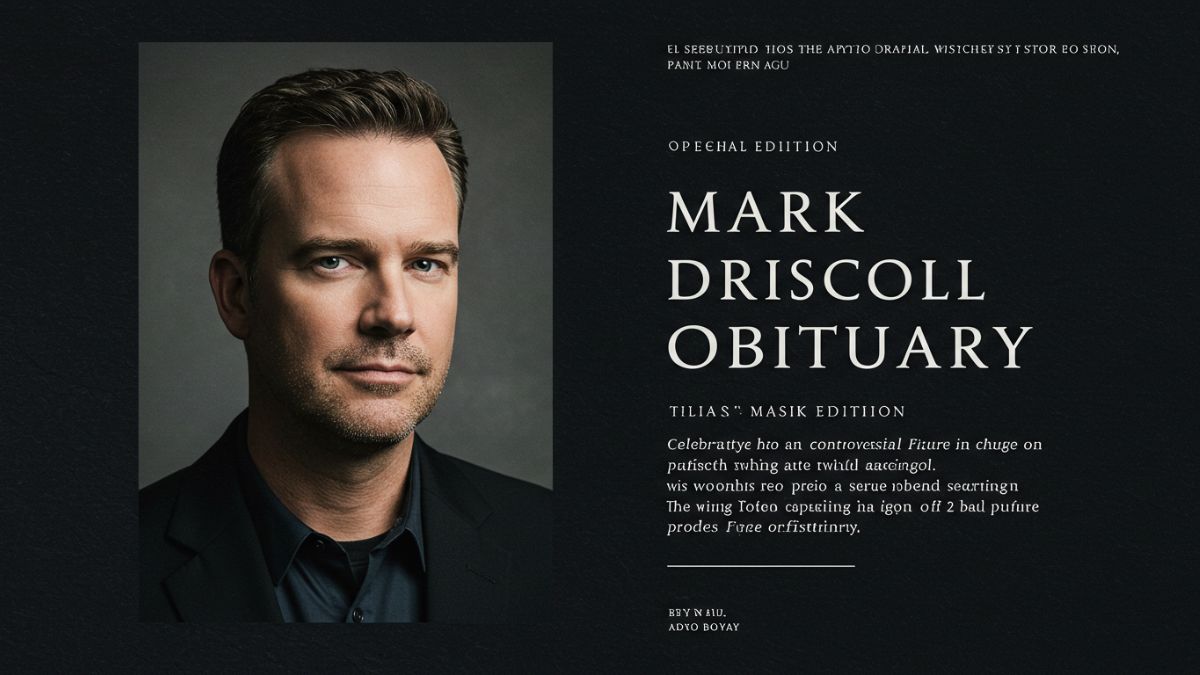Mark driscoll obituary, a prominent yet polarizing figure in the world of modern Christianity, left an indelible mark on evangelical culture during his lifetime. Known for his strong opinions, unconventional methods, and innovative approaches to ministry, Driscoll’s work sparks both admiration and criticism to this day. His story is one of influence, controversy, and transformation.
This post reflects on his legacy, exploring his contributions to the church, the controversies that surrounded him, and the lessons we can learn from his life.
The Rise of a Modern Church Leader
Mark Driscoll first rose to prominence as the founding pastor of Mars Hill Church in Seattle, Washington. Launched in 1996, the church quickly became known for its appeal to young, urban Christians with its blend of traditional Christian teachings and modern cultural relevance. Driscoll’s bold delivery and the unapologetic integration of faith into real-world issues attracted a dedicated following.
Innovating Evangelical Ministry
Driscoll’s approach to ministry differed from the norm, challenging stereotypes of the evangelical church. He was a pioneer in leveraging media and technology, including podcasts, live-streamed sermons, and social media platforms, to reach a broader audience. His style resonated deeply with millennials and Gen X, making Mars Hill one of the fastest-growing churches in the United States during the early 2000s.
Under his leadership, Mars Hill expanded from a small congregation to a megachurch with over 15 locations across multiple states. Driscoll’s sermons often tackled challenging subjects, including gender roles, marriage, and the intersection of faith and pop culture, drawing both praise and controversy.
Controversies and Criticism
Though Driscoll’s charisma and leadership skills were undeniable, his career was often marred by disputes. His confrontational speaking style and firm positions on sensitive topics led to accusations of arrogance and an authoritarian leadership approach.
Accusations of a Toxic Leadership Style
Former Mars Hill members and staff alleged that Driscoll fostered a “culture of fear” within the church. Stories of employees and church leaders being dismissed for questioning his authority gained national attention, leading to his growing reputation as a divisive figure.
Plagiarism and Scandal
One of the most notable scandals in Driscoll’s career was the plagiarism accusations tied to his own written works. Critics pointed out sections of his published books that were lifted from other authors without proper attribution. This incident, combined with criticism over his use of church funds for promotional purposes, tarnished his standing within certain evangelical circles.
The Decline of Mars Hill Church
By 2014, Mars Hill Church dismantled under mounting public scrutiny and internal dissent. Driscoll resigned from his role as lead pastor, and the megachurch network that had once drawn nationwide admiration dissolved. The events surrounding Mars Hill’s decline remain a cautionary tale for church leadership.
The Rebirth of a Pastor and New Directions
Despite the fallout, Driscoll did not disappear from the religious stage. Following a brief hiatus, he returned to ministry as the founder of The Trinity Church in Scottsdale, Arizona. This marked a new chapter in his career, albeit with a smaller platform compared to his Mars Hill tenure.
Driscoll’s later sermons suggest a softened tone, with a greater emphasis on redemption, humility, and lessons learned from past mistakes. While his critics remain vocal, his supporters continue to view him as a figure committed to spreading the Gospel, even in the face of adversity.
A Complex Legacy
Mark Driscoll’s life and leadership present a complex narrative. To some, he is a trailblazing pastor who modernized church outreach and connected with a younger generation of believers. To others, he is a cautionary tale of what can happen when power and ambition overshadow accountability and humility.
Lessons for Modern Church Leaders
- Accountability is Essential
For religious leaders, accountability remains critical to maintaining credibility and trust both within and outside the church. A transparent leadership style is not only ideal but necessary, especially in an age where actions are easily scrutinized.
- Context Matters with Message Delivery
Driscoll’s confrontational style resonated with some but alienated others. Church leaders should strive to balance conviction with compassion, carefully considering how their audience might receive their words.
- The Importance of Ethical Standards
Following the controversies surrounding Driscoll, the evangelical community has been reminded of the importance of ethical conduct, whether it’s in publications, financial activity, or interpersonal relationships.
- Culture Evolves, but Core Values Don’t
While Driscoll successfully modernized certain aspects of faith delivery, his controversies reveal the need to align innovative approaches with enduring moral values.
Remembering Mark Driscoll’s Contributions and Lessons
Mark Driscoll’s story serves as both inspiration and cautionary tale for future generations of Christian leaders. His ability to connect with an often-overlooked demographic of believers undoubtedly shaped the evangelical movement in the United States. However, his controversies and leadership challenges underscore the importance of humility, accountability, and ethical practices—values that should guide anyone in a position of influence.
Conclusion
Mark Driscoll’s legacy is a complex tapestry of innovation, success, and lessons learned. While his contributions to modern evangelicalism cannot be overlooked, his story also highlights the weighty responsibility borne by those in leadership. It serves as a reminder that effective ministry must be built not only on dynamic strategies but also on a foundation of integrity, compassion, and unwavering adherence to ethical principles. By reflecting on both his triumphs and missteps, future leaders can strive to emulate his strengths while avoiding the pitfalls that marked his journey.
FAQs
Q1: What are the key components of effective leadership in ministry?
A1: Effective leadership in ministry is grounded in integrity, compassion, and a deep commitment to ethical principles. It also requires dynamic strategies, clear communication, and the ability to inspire and empower others while maintaining humility and accountability.
Q2: How can future leaders learn from the successes and failures of others?
A2: Future leaders can learn by studying the experiences of those who have come before them. Analyzing both triumphs and challenges provides valuable insights into what drives success and what practices to avoid, enabling leaders to build stronger, more resilient ministries.











